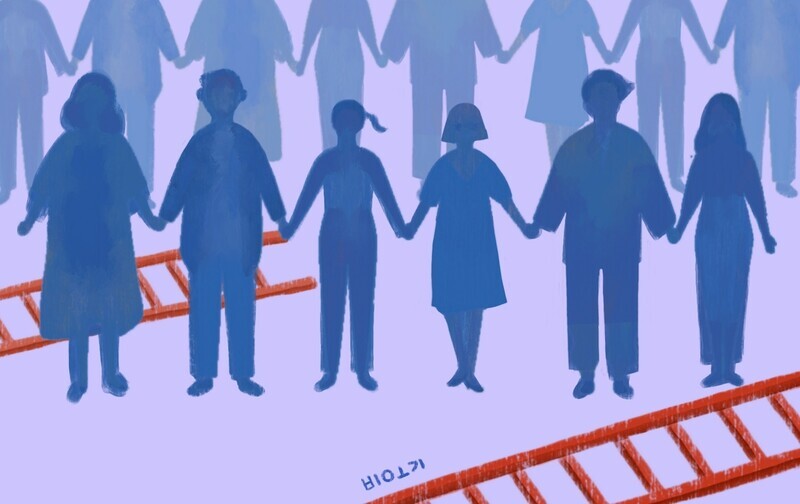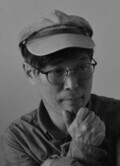hankyoreh
Links to other country sites 다른 나라 사이트 링크
[Column] Down with the so-called social ladder


“Eyes closed and hands on your head!”
The proctoring teacher’s voice resounded across the exam hall as everyone held their breath. When the Korean language arts test booklet for the first section of the exam was placed on my desk, I thought my heart would burst. “Start!”
When I finally opened my eyes and looked at the test, the first passage immediately gave me a mental breakdown. It wasn’t from the textbook. It was the first time a passage that wasn’t in the textbook was featured in the college entrance exam. Sighs from my fellow test-takers filled the room at the unexpected turn of events. My heart kept pounding as well. But then, as I read the passage, I realized that it felt familiar. It was an excerpt from a short story by Gim Yu-jeong I had enjoyed. At that moment, all I could do was thank heaven. I regained some confidence. I screwed up in a later section of the test, but my score for Korean made up for it. I still remember that day vividly dozens of years later.
We live in a world where the college you attend plays a significant role in determining your social class and prestige. Everyone is interested in college admissions, and admissions fairness is a core agenda for education reform. When the College Scholastic Ability Test was held last week, there was an outpouring of messages cheering for test-takers. While they were well-meant, the reality is a lot harsher. Only a minority end up “winners.” The treacherous ladder of hierarchy in higher education grows narrower the closer you are to the top, not to mention steeper.
At some point, people started lamenting about how the ladder of upward mobility in Korean society has been cut off. In the past, there were many cases in which people from tough backgrounds were admitted to “elite universities” by studying hard and were able to climb the social ladder, but this has become much more difficult. Dragons don’t rise from streams anymore, the criticism goes. Economist Ju Biung-ghi notably came up with the “opportunity inequality index” that calculates the probability of someone with bottom 20% earners as parents eventually becoming a top 20% earner. This index increased from 19.79 in 1990 to 34.82 in 2016, meaning opportunity inequality approximately doubled during that time.
Politicians promised to resolve this issue. As a presidential candidate, former President Moon Jae-in pledged to “rebuild the education ladder that has been destroyed,” while President Yoon Suk-yeol vowed to “set up the ladder of class mobility that has been broken once again by supporting young Koreans’ efforts to build assets.”
Democratic Party leader Lee Jae-myung’s promise went further. Despite controversy, he declared to “guarantee class mobility by resurrecting the bar examination and expanding regular admissions.” Similarly, Seoul Mayor Oh Se-hoon said he would “rebuild the ladder of class mobility through Seoul Learn,” an online learning platform for the disadvantaged. He effectively pledged to utilize public funds to subsidize private education — ironic. Promises to rebuild the social mobility ladder abound from both sides of the political aisle.
Prominent politicians from the West are no different. Former British Prime Minister Tony Blair, known for his rebranding of the Labour Party, promised to create a society centered around a strong middle class, one that would provide everybody with the opportunity to succeed. During a speech made in his political hometown of Hyde Park, Chicago, Barack Obama, the first black president of the United States, said, “I’m here to make sure that we talk about and then work towards giving every child every chance in life; building stronger communities and new ladders of opportunity that they can climb into the middle class and beyond; and, most importantly, keeping them safe from harm.”
In fact, most politicians make some sort of promise to restore social mobility and to reestablish the ladders of opportunity. Yet inequality continues to worsen, if anything. Why is that? Is it because all politicians are liars, and are actually the first to chop the ladders down? I’m wary of falling into this type of cynicism. Let’s approach it from a different angle. It seems that the more people concentrate on restoring the ladders of opportunity, the worse inequality gets.
Let’s go back to the late 1950s, when British progressives began focusing heavily on creating ladders of social mobility. Socialist writer and critic Raymond Williams flipped the ladder concept on its head by claiming that the social ladder was a perfect symbol of the bourgeoisie worldview. Sure, the ladder offers the opportunity for upward movement, but only one individual can climb it at any given time. That person moves up alone.
So what happens when we, as a society, focus too much on individualistic, ladder-type success?
First, the collective mission to create or improve the community is weakened. Second, a vertical power structure is further normalized. The ladder of opportunity promises equality, but it also further divides and creates more inequality. Yet despite Williams’ criticisms, the ladder became a social and political buzzword, giving rise to the concept of “equality of opportunity.” This is the phrase politicians default to when they’re afraid of calling for a reduction in “inequality of outcome.”
The metaphor of the ladder goes hand in hand with that of “everyone starts the race at the same starting line.” Because we all start the race at the same place, the analogy goes, the results of the race are justified. Once the gun goes off, the results are in the hands of the individual competitors. There’s no reason to interfere with the first place and last place runners, so there’s no reason to meddle with inequalities of outcome.
Life is not a track race, and there is no universal starting line in the real world. One person starts off driving a sports car, while another starts off riding a bicycle. One leans on motorization, while the other relies on his legs to move forward. Sometimes with parents or family on their back. Just work harder? Yet even opportunities to work hard fall unevenly.
In order to remedy these disparities, it’s necessary to interfere in inequalities of outcome. This is why anybody who seriously considers the idea of equality of opportunity is forced to reconcile with the idea of equality of outcome. This uncomfortable truth is ignored by mainstream politicians.
This is coming from someone who has more or less climbed the opportunity ladder. As a student, when the test presented a passage that wasn’t in the textbook, I experienced a burst of confidence rather than fear. This is probably because of the fat literature anthology sitting on the bookshelf at home. If that anthology had never been on that shelf, I would never have gotten the opportunity to read it, regardless of my personal interests or willpower. While I was climbing the ladder, many kids never even had the chance to stand at its foot.
Even at the end of the 1980s, when the number of Koreans continuing on to college shot up, the university enrollment rate was only around 30%, and that’s including two-year schools. In that sense, my fond memory of that literary excerpt on the exam is an example of my “privilege” in its own right.
There are two paths before us. One requires us to band together in solidarity with one another and reduce inequality itself. The other involves each individual clamoring up the ladder of success on their own. To go down this latter path would be to fire the starting shot of an interminable race in which each person must fend for themselves.
For decades now, discourses on social reform in Korea have revolved around this image of the ladder. In that time, Korea has become a vertically unequal society in which each individual must fight on their own to even set foot on any such ladder. Solidarity and democracy have fallen by the wayside.
It’s time we get rid of this ladder that only allows us to go up alone, one by one.
Please direct questions or comments to [english@hani.co.kr]

Editorial・opinion
![[Column] Season 2 of special prosecutor probe may be coming to Korea soon [Column] Season 2 of special prosecutor probe may be coming to Korea soon](https://flexible.img.hani.co.kr/flexible/normal/500/300/imgdb/original/2024/0426/3317141030699447.jpg) [Column] Season 2 of special prosecutor probe may be coming to Korea soon
[Column] Season 2 of special prosecutor probe may be coming to Korea soon![[Column] Park Geun-hye déjà vu in Yoon Suk-yeol [Column] Park Geun-hye déjà vu in Yoon Suk-yeol](https://flexible.img.hani.co.kr/flexible/normal/500/300/imgdb/original/2024/0424/651713945113788.jpg) [Column] Park Geun-hye déjà vu in Yoon Suk-yeol
[Column] Park Geun-hye déjà vu in Yoon Suk-yeol- [Editorial] New weight of N. Korea’s nuclear threats makes dialogue all the more urgent
- [Guest essay] The real reason Korea’s new right wants to dub Rhee a founding father
- [Column] ‘Choson’: Is it time we start referring to N. Korea in its own terms?
- [Editorial] Japan’s rewriting of history with Korea has gone too far
- [Column] The president’s questionable capacity for dialogue
- [Column] Are chaebol firms just pizza pies for families to divvy up as they please?
- [Column] Has Korea, too, crossed the Rubicon on China?
- [Correspondent’s column] In Japan’s alliance with US, echoes of its past alliances with UK
Most viewed articles
- 1‘We must say no’: Seoul defense chief on Korean, USFK involvement in hypothetical Taiwan crisis
- 2Why Kim Jong-un is scrapping the term ‘Day of the Sun’ and toning down fanfare for predecessors
- 3Two factors that’ll decide if Korea’s economy keeps on its upward trend
- 4BTS says it wants to continue to “speak out against anti-Asian hate”
- 5After election rout, Yoon’s left with 3 choices for dealing with the opposition
- 6Gangnam murderer says he killed “because women have always ignored me”
- 7South Korea officially an aged society just 17 years after becoming aging society
- 8Noting shared ‘values,’ Korea hints at passport-free travel with Japan
- 9Ethnic Koreans in Japan's Utoro village wait for Seoul's help
- 10US citizens send letter demanding punishment of LKP members who deny Gwangju Massacre